Should I Hire a Dietitian?
March 8, 2017 by Ginger Hultin MS RDN
Confusion sometimes surrounds the dietary and nutrition profession. Is it spelled “dietician” or “dietitian”? Are registered dietitians and nutritionists the same thing? If I start seeing a dietitian, will I have to give up dessert? I’m here to clear the air and debunk the mystery surrounding nutrition professionals and help answer the question: Should I hire a dietitian?
Unfortunately, people still think of us as the “food police” sometimes and confusion abounds about what a dietitian does and even the difference between an RDN and a nutritionist. Many times when I’m out at dinner and someone finds out what I do, they start apologizing for what they’re eating…. or sometimes if I’m drinking wine or eating pizza, someone will say to me, “what kind of dietitian are you, anyway? Aren’t you supposed to eat healthy?” It’s so important to have an ongoing discussion to clear confusion and I welcome questions about what RDNs do.
The RD credential is hard-earned. To get into this profession, you must earn a degree in nutritional science and then you are required to complete a 1200 hour supervised practice internship. As an intern, we do rotations on different floors in a variety of specialties like surgical, renal, pediatric, long-term care, oncology, and many more. Dietitians get special training in interpreting and doing our own research, in management, industrial food service, community work and in schools. One of my favorite rotations was at an HIV clinic that was also a food pantry – we got to help people so much and it was an amazing program. After all that, we have to pass an exam to become a Registered Dietitian and then we need to keep it up with required continuing education every 5 years forever into the future.
A nutritionist can be completely legit and have a degree in nutrition, too…..or they could get a certificate online and have no training whatsoever. The term ‘nutritionist’ is largely unregulated and so Registered Dietitian is a higher credential (though we ARE nutritionists, too). RDNs can be found working in a variety of different fields, like working with kids in a school district, with athletes and sports teams, leading wellness initiatives within a large organization, hosting nutrition segments through social media (hello, Joy Bauer!), as well as in hospital and outpatient settings.
And this is why you should hire a dietitian!
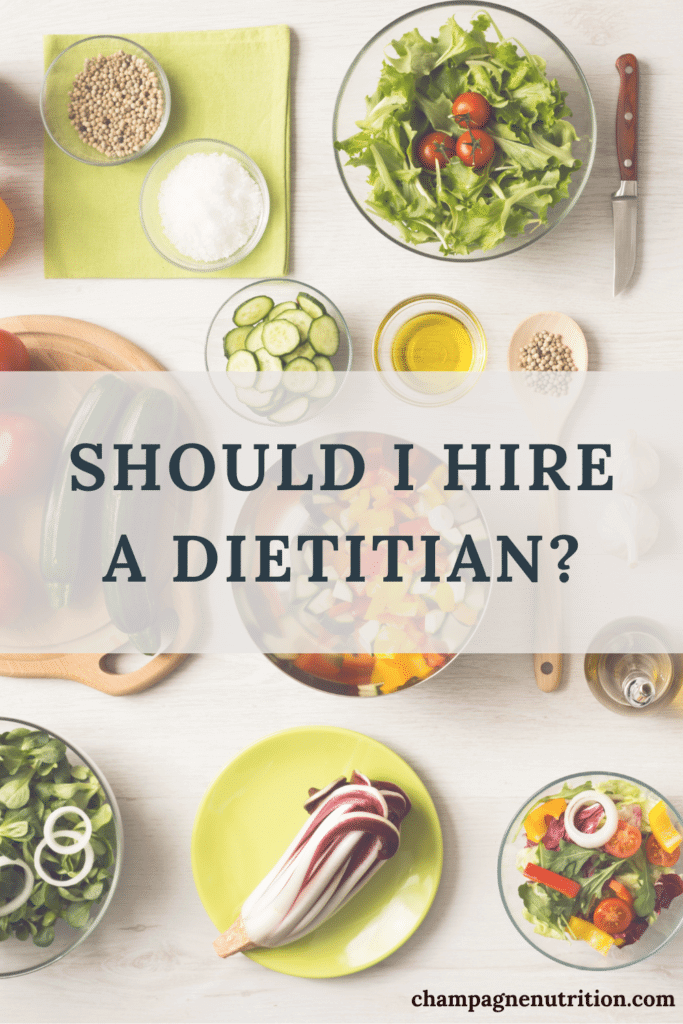
5 things a dietitian can do for you
1. Help you increase your physical activity
Being active and eating well are so intertwined that dietitians can talk about both! Not all dietitians are experts in physical activity but many are and all of them get education on the topic. I hold certifications in group fitness and personal training as do many of my RD friends. In fact, I became a dietitian because my interest was piqued when working at a gym. All sports teams have dietitians on staff and many of us do work with athletes. Those who do that type of work are specialists in that area but all of us are able to provide recommendations about how much exercise to get and how best to fit it into your schedule. We can also talk about how to fuel your workout with food and hydration and discuss other considerations like how to keep blood sugar stable during activity and how much protein or carbohydrate you need for workouts. If you meet with an RDN, don’t be surprised if they ask about your activity level and bring it in as part of your health plan.
2. Interpret labs
Have you ever been to your doctor for labs and an assistant calls you and says, “everything is normal, have a nice day”? So frustrating! Dietitians all get training on interpreting labs and are well equipped to educate regarding cholesterol, triglycerides, vitamins, iron status, blood composition, inflammatory markers and more. My job is to spend about an hour with my patients to review their labs extensively and in detail, educating people on what they should do to move the labs in a positive direction. In fact, interpreting labs is one of my favorite things about being a dietitian – and something that really sets us apart from other medical professionals and folks who get certifications in nutrition without adequate education. Our medical training and time spent in hospital rotations make us experts in lab interpretation so if you have questions about what your labs mean or how to change them, ask your doctor for a referral to a registered dietitian for support.
3. Help Heal your Relationship with Food
Eating disorder? Disordered eating? Restriction, binge, “good” vs “bad” foods, no carbs, no fat….dietitians get special training in helping people heal their relationship with food. Some dietitians work at eating disorder clinics or hospitals with patients going through active treatment. Others help people who want to get off the weight loss/gain roller coaster with eating intuitively, listening to their hunger cues, and better understanding how to eat for their own needs to achieve the weight they desire. Some dietitians teach a health at every size model, taking the emphasis off weight altogether. If you need some help with your relationship to food, a dietitian is a great place to start. Dietitians genuinely care about your health and know that people can be healthy at many different sizes. Seeking support from a Registered Dietitian Nutritionist can be critical for children or young adults struggling with these types of eating concerns. A visit with an RDN is an important referral early on as kids learn about how to eat properly to fuel their bodies for health.
4. Teach you how to cook
Did you know that dietitians get special training in cooking and recipe development? We all do food service rotations during the internship and many of us are active cooks or chefs ourselves. I took a class called Whole Foods Cooking at Bastyr University as part of my nutrition education but there are also full nutrition programs that combine culinary skills with the RDN credential. Many dietitians I know are food bloggers and spend the majority of their time creating recipes, writing cookbooks, and teaching others how to cook healthfully. One thing we specialize in is how to cook traditional recipes but in a healthier way; think skillet tempeh enchiladas by RDN friend Danielle Omar, Sriracha Peanut Naan Pizza by dietitian chef Sara Haas, or Easy Tomato Carrot Soup with Herb Fried Bread by dietitian friend Stephanie McKercher. If you’re familiar with my blog, you know that it’s set up to be plant-based but completely versatile for your needs, quick and easy for all of you busy folks on the go (like me!). I wrote a meal prep book in honor of how much I want cooking to be easier for you and I also have some awesome recipes on the blog here for that reason including my famous blueberry oat bake, my vegetarian chili and the best vegetarian lasagna ever. If you want to cook more at home, develop your cooking skills, learn more about meal planning or finding good recipes for your family, a Registered Dietitian Nutritionist is definitely the place to start.
5. Help you with your Supplements
Dietitians receive special education in dietary supplements so we are well-equipped to assess the need for and answer questions about vitamins and minerals. You’ll always hear us educate about the food sources of a given vitamin or mineral first but sometimes that’s not enough for a variety of reasons. I’m a Certified Specialist in Oncology Nutrition and this is a population who certainly can benefit from supplements because they sometimes have poor intake of food combined with increased nutritional needs. Whether you want to know how much vitamin D to take, how much vitamin C you can get from eating oranges, or which brand of fish oil is of the highest quality, a Registered Dietitian Nutritionist is likely the best health professional you can ask.
There are many more things your dietitian can do for you, of course. The important thing is to get started seeing one as part of your health care team! I feel so lucky to work in this wonderful profession.
4 Comments
Leave a Comment
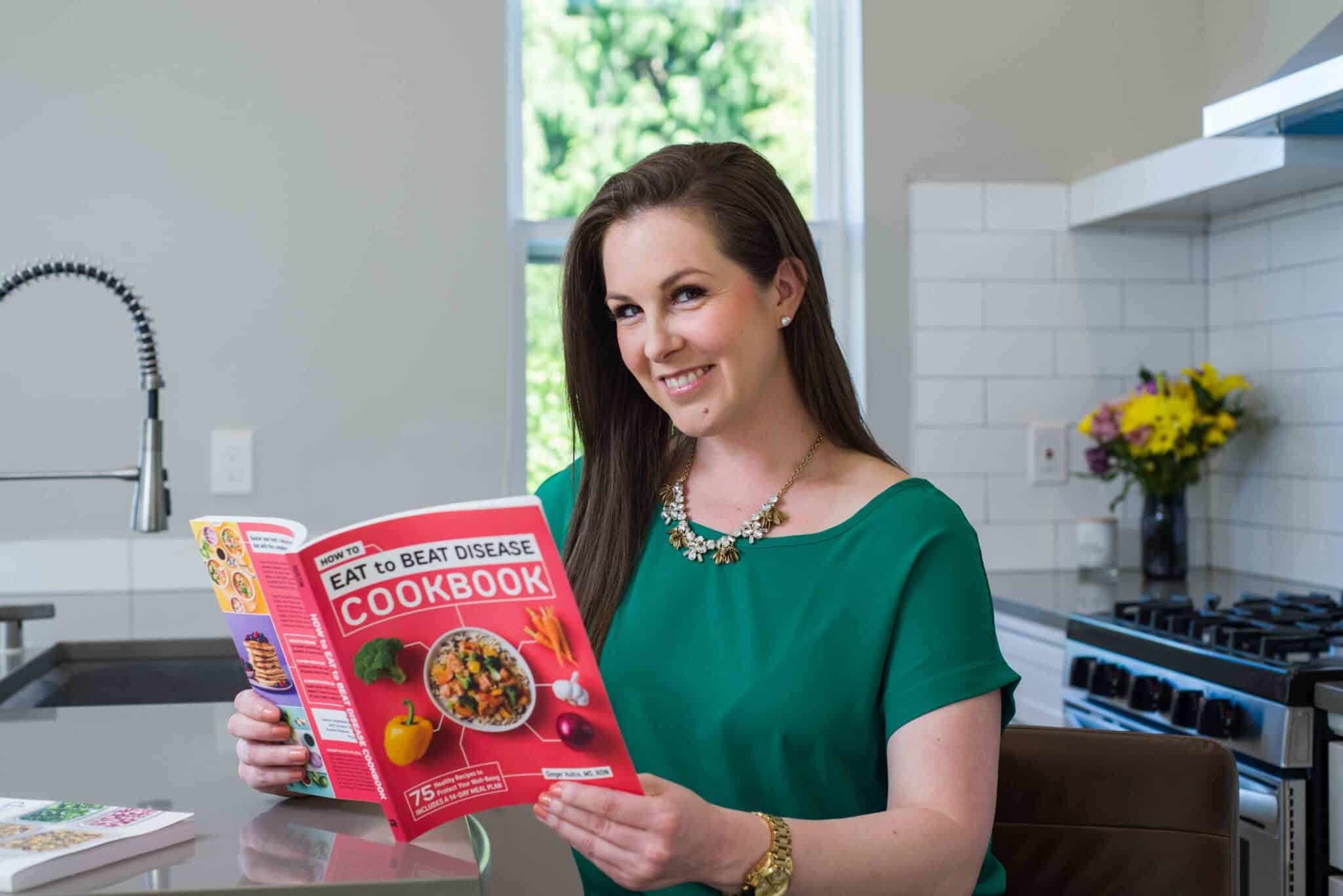
Ginger Hultin,MS, RD, CSO
Thanks for visiting! If you're struggling with a cancer diagnosis, autoimmune condition, gut health problems, or even a medical mystery, nutrition can make a HUGE difference in your day-to-day life. I run a virtual, concierge private practice where I partner with my clients over time to help them improve their health through nutrition. Be sure to visit the blog for easy, plant-based, anti-inflammatory recipes and our "Resources" page for a variety of self-paced programs, books, e-books, and nutrition podcast episodes.

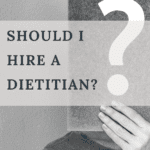
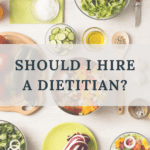
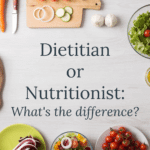
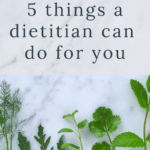

Such a great post promoting our profession, Ginger! RDNs are pretty awesome, aren’t we???
Great post Ginger, and happy RD day to you! 😀
Such a great post Ginger! Sometimes even I forget about the wealth of experience and expertise we provide!
Interesting post! This really clears up a lot of the confusion I had around dietitians versus nutritionists, so thank you!